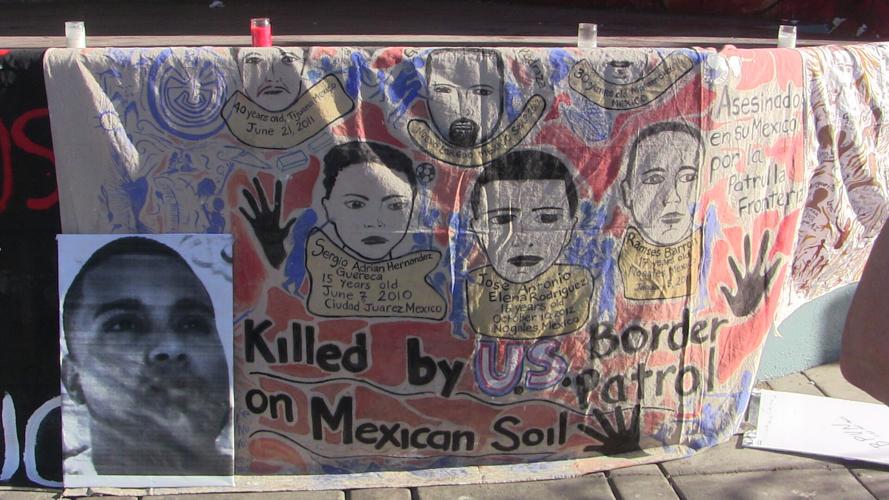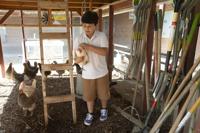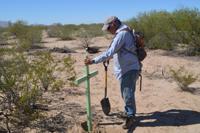
Family and friends of 16-year-old José Antonio Elena Rodríguez demand justice for the teen who was shot and killed by a U.S. Border Patrol agent on October 10, 2012. (César Barron / CALÓ News)
Nogales, Arizona – Almost 13 years after his death, the family of José Antonio Elena Rodríguez is still demanding justice, seeking support from human rights organizations and attempting to take the case all the way to Mexican President Claudia Sheinbaum.
On Oct. 10, 2012, the 16-year-old was killed after being shot multiple times by a U.S. Border Patrol agent just steps from the border fence near Nogales, Sonora. For more than a decade, his family has continued to fight for justice.
His mother, Araceli Rodríguez, and his grandmother, Taide Elena, are now seeking a meeting with Sheinbaum to open up a case against the agent in Mexican courts.
“We are still fighting, we are still asking for justice,” Rodríguez told CALÓ News from Nogales, Sonora.
“We want the agent who killed José Antonio to be tried in Mexico, even if he isn't present,” Elena said, adding that if that happens, there would be justice for their family.
Elena Rodríguez's case has resonated for years due to the manner in which he was killed.
He was shot and killed through the border wall that divides Nogales, Arizona, from Nogales, Sonora, while he was in Mexican territory and the shooter was in the United States.

Family and friends of 16-year-old José Antonio Elena Rodríguez demand justice for the teen who was shot and killed by a U.S. Border Patrol agent on October 10, 2012. (César Barron / CALÓ News)
The border agent involved, Lonnie Swartz, shot him, claiming that he had thrown rocks at him. He was shot in the back ten times and died on the corner of Internacional and Ingenieros Streets.
Following the events, Swartz faced two homicide trials, but the jury was unable to reach a verdict in either.
Although the Mexican federal government had previously promised help and even psychological care for the family, it never arrived. They were told that psychologists would visit their homes periodically, but that never happened, Rodriguez said.
They are currently knocking on doors and seeking the appropriate means to be heard and to set up an appointment with the president.
Attorney Luis Fernando Parra has represented the family on this difficult path they have traveled for years.
Parra stated that along with bringing the case before Sheinbaum, an administrative and human rights complaint has been filed with the Inter-American Commission on Human Rights (IACHR) of the Organization of American States, which promotes and protects human rights across the Americas.
A response was received in April 2025, noting that the United States government had not submitted a response. The IACHR gave the government six months to respond, but the United States government is not obligated to respond because it is not a party to a treaty, Parra explained.

Family and friends of 16-year-old José Antonio Elena Rodríguez demand justice for the teen who was shot and killed by a U.S. Border Patrol agent on October 10, 2012. (César Barron / CALÓ News)
"This is being done so that there is a global record that a human rights violation occurred," Parra said.
He noted that in filing this claim, they had the support of the American Civil Liberties Union (ACLU) and a California law firm.
Although there were two trials to charge Swartz — one for intentional homicide and the other for negligent homicide — the jury could not agree in either case, so the agent was ultimately acquitted. With that, the criminal case was closed.
Regarding the civil case, Parra explained that less than two years after the incident, in 2014, he and other attorneys filed a civil lawsuit, arguing excessive use of force and that the agent fired across a border.
The case reached the Ninth Circuit Court of Appeals in California, which ruled that a civil claim was admissible in Tucson. However, there was a similar case that occurred in June 2010 in Ciudad Juárez, where Border Patrol agent Jesús Meza shot and killed 15-year-old Sergio Adrián Hernandez in Rio Grande. The Fifth Circuit Court of Appeals in Texas ruled that a civil claim was not admissible in this case. Due to conflicting decisions between the two courts, the case ended up before the U.S. Supreme Court, the attorney explained.
In 2019, the Supreme Court ruled that a civil claim was not admissible in those cases — that of Hernández and that of Elena Rodríguez.
Given this, attorneys for both families opted to file an administrative claim petition with the IACHR. Now, the Elena Rodríguez family's hope rests in the hands of the Mexican government.
César Barrón is an independent reporter covering the transnational communities of Ambos Nogales. He has over 20 years of experience covering the Sonoran communities.

















(0) comments
Welcome to the discussion.
Log In
Keep it Clean. Please avoid obscene, vulgar, lewd, racist or sexually-oriented language.
PLEASE TURN OFF YOUR CAPS LOCK.
Don't Threaten. Threats of harming another person will not be tolerated.
Be Truthful. Don't knowingly lie about anyone or anything.
Be Nice. No racism, sexism or any sort of -ism that is degrading to another person.
Be Proactive. Use the 'Report' link on each comment to let us know of abusive posts.
Share with Us. We'd love to hear eyewitness accounts, the history behind an article.